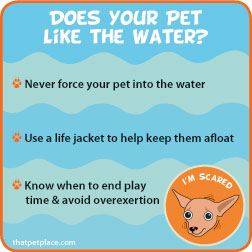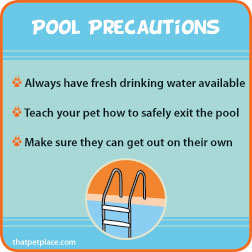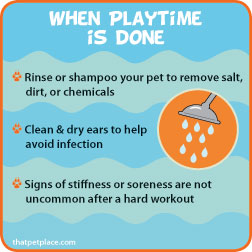Summertime is full of opportunities for most of us to get out and enjoy the beautiful weather. But as we all know, that searing summer sun can be intense and in the search for some reprieve we often find ourselves poolside, in local stream, river, lake, or on the beach. If you’re like me, you likely have your pet along too. My pup is a water-lover; if there is a way for her to get wet she will be. While it’s always fun having her along to play or go for a swim, it’s also important to keep any pet’s safety in mind while on, in, or near water. Here are some things to keep in mind as you splash through summer with your favorite four-legged companion.
Does Your Pet Like The Water?
The first thing to think about (especially if this is the first season you’ll be taking your pet in or near water) is that not all pets can swim, swim well, or want to swim. While some dogs seem like they were born to swim and take to it immediately, others struggle with fear of the water, panic in the water, or even find themselves in peril due to their own physiology. In my experience, toy breeds tend to be less than enthusiastic about water. I’m sure there are exceptions to my observations, but in general they have no interest and may even tremble at the sight. Likewise, breeds and mixes with thick bodies, short legs, cropped/short tails, and short snouts are prone to being terrible swimmers. Though they may be interested in swimming, you may find that it just doesn’t work out for them without a little help and constant supervision. You may consider purchasing a life vest to help to keep your pet afloat. Never force your dog into the water. Allow them to approach and investigate on their own under close supervision. If he or she seems anxious or scared, water play may not be for your pet, and taking them into the water may only increase that fear or anxiety. Some pets like to take a quick dip, others may stay in the water all day if you let them. You can usually tell when it’s time to take a rest just by the way your pet is holding himself. Know when it’s time to wrap up play time, especially when the temperatures soar to avoid over exertion.
season you’ll be taking your pet in or near water) is that not all pets can swim, swim well, or want to swim. While some dogs seem like they were born to swim and take to it immediately, others struggle with fear of the water, panic in the water, or even find themselves in peril due to their own physiology. In my experience, toy breeds tend to be less than enthusiastic about water. I’m sure there are exceptions to my observations, but in general they have no interest and may even tremble at the sight. Likewise, breeds and mixes with thick bodies, short legs, cropped/short tails, and short snouts are prone to being terrible swimmers. Though they may be interested in swimming, you may find that it just doesn’t work out for them without a little help and constant supervision. You may consider purchasing a life vest to help to keep your pet afloat. Never force your dog into the water. Allow them to approach and investigate on their own under close supervision. If he or she seems anxious or scared, water play may not be for your pet, and taking them into the water may only increase that fear or anxiety. Some pets like to take a quick dip, others may stay in the water all day if you let them. You can usually tell when it’s time to take a rest just by the way your pet is holding himself. Know when it’s time to wrap up play time, especially when the temperatures soar to avoid over exertion.
Other conditions may also make it hard for pets to partake in water activities. Small dogs and dogs with little or no fur can become cold quickly, even in warmer water. Older dogs and dogs with pre-existing heart, joint, ear or skin conditions could have flare-up after going for a swim.
Check Your Surroundings
My pet and I tend to seek out freshwater rivers, streams, and lakes to cool off. When you take your pet somewhere
and lakes to cool off. When you take your pet somewhere
to swim (no matter where) be sure to look around the area. Posted signs such as “no swimming” signs should not just apply to you, but to your pet as well as there may be unseen safety hazards. Avoid bodies of water that smell bad or may be prone to farm waste, roadway runoff or other contaminants that may be harmful to you or your pet. Also be aware of potential hazards in the shallows or on the shore such as broken glass, fishing line/hooks, sharp rocks or branches, and other potential hazards. Be sure the area you choose has slow current and areas where he or she can reach the bottom or the shore easily to take a breather.
If you live near the coast, you may be lucky enough to take your dog to the beach for playtime. It’s particularly important to pay attention to wildlife and water condition warnings at these locations. Strong tides, waves and undercurrents can pull your pet under or carry them out into deeper water. Jellyfish and other sea life (such as toxic pufferfish), alive or dead, may be washed onto the shore and can make a pet sick or inflict other injuries.
Boat Safety
Some pet owners even take their pets boating. Pets should 
be acclimated to traveling on watercraft before you embark.
The motion of the water rocking the boat may cause them to feel unstable and nauseated and it may cause nervousness and anxiety. The sound of the boat motor may also frighten some pets, so make sure your pet isn’t alarmed when the motor is started or changes pitch. Once they’re accustomed to the new sounds and sensations, be sure to observe the same boat safety for your dog as you do for yourself and other passengers. Invest in a pet life jacket in case your pet jumps or falls overboard. Keep tackle and other potentially harmful objects and materials out of the dog’s reach to avoid injury or ingestion. Provide plenty of fresh cool water and a place for your pet to get out of the direct sun. Sunscreen for pets and eye protection such as doggles or a doggie visor are also recommended supplies,
especially for repeated or longer trips.
Pool Precautions
Some of you may have a pool in the backyard. If you allow your dog to take a dip on hot days, teach him how to get out of the pool on his own by helping him up the stairs or ladder a few times. Make sure he knows where the way out is and that he can get out on his own! Keep fresh-chlorine free water near the pool on the deck or patio so he doesn’t take to drinking to pool water. The chlorine and other chemicals that keep the pool crystal clear can give your pet quite a tummy ache.
your dog to take a dip on hot days, teach him how to get out of the pool on his own by helping him up the stairs or ladder a few times. Make sure he knows where the way out is and that he can get out on his own! Keep fresh-chlorine free water near the pool on the deck or patio so he doesn’t take to drinking to pool water. The chlorine and other chemicals that keep the pool crystal clear can give your pet quite a tummy ache.
When Playtime is Done
When your day of fun is done, rinse or shampoo your dog to remove pool chemicals, salt and other residue from his skin and coat. Take care to clean and dry his ears to avoid ear infections. Even a well-conditioned swimmer will be sure to sleep well after a day in the water, your pet may even be a little stiff and sore if he doesn’t have a workout like that often. Rest assured that in a day or two he’ll be ready for his next swim session!
remove pool chemicals, salt and other residue from his skin and coat. Take care to clean and dry his ears to avoid ear infections. Even a well-conditioned swimmer will be sure to sleep well after a day in the water, your pet may even be a little stiff and sore if he doesn’t have a workout like that often. Rest assured that in a day or two he’ll be ready for his next swim session!
 That Pet Blog That Pet Place Pet Blog
That Pet Blog That Pet Place Pet Blog

Pretty nice to know that there were blog post really concerning regarding our pets safety, kudos to my friend 🙂
I have three dogs and they absolutely love the water! Whenever we go camping, they love to play in the creek and just cool down. I am always a little worried about them getting bitten by something or hurt in another way. I am glad to know that there is an animal hospital here in Lakeland, FL that I can go to if something happens. Thanks for the other advice, I will definitely use it!